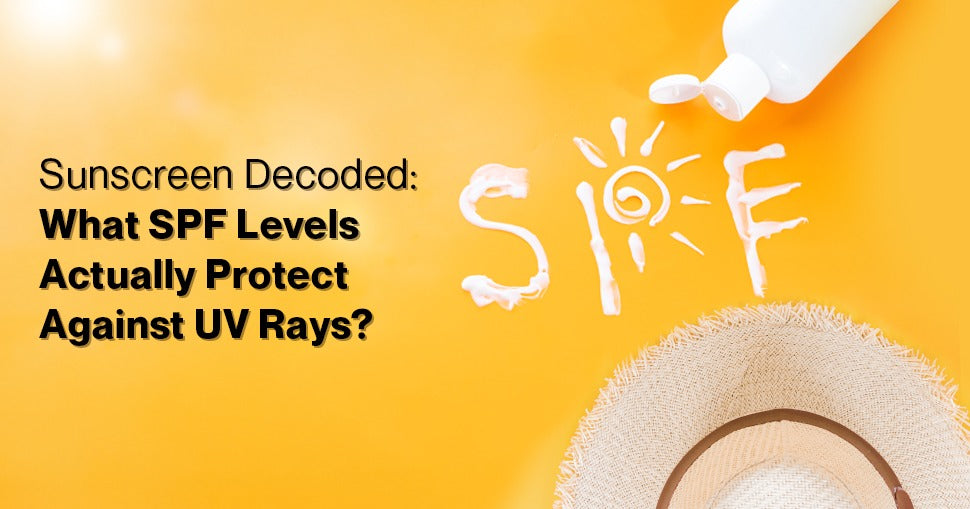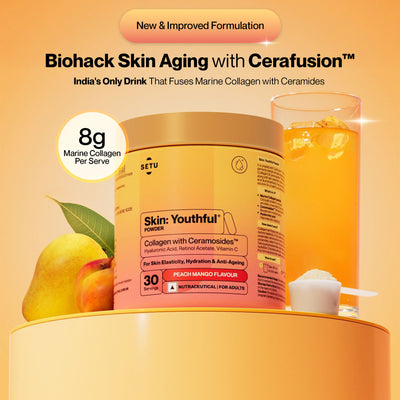Sunscreen Decoded: What SPF Levels Actually Protect Against UV Rays?
20 Dec 2024
Protecting your skin from the sun’s harmful ultraviolet (UV) rays is essential, not just for maintaining a youthful appearance but also for reducing the risk of skin cancer. With the growing variety of sunscreens on the market, including topical options and newer innovations like drinkable sunscreen, it can be overwhelming to understand what SPF levels actually mean and how they safeguard your skin.
In this article, we dive into the science of SPF, explore the effectiveness of UV neutralizers like drinkable sunscreen, and decode how you can make the best choice for comprehensive sun protection.
What Is SPF and How Does It Work?
SPF, or Sun Protection Factor, measures how effectively a sunscreen protects your skin from UVB rays, the type of UV radiation that causes sunburn and contributes to skin cancer. An SPF number indicates the level of protection a product offers:
- SPF 15: Blocks about 93% of UVB rays.
- SPF 30: Blocks about 97% of UVB rays.
- SPF 50: Blocks about 98% of UVB rays.
It’s important to note that no sunscreen can block 100% of UV rays, and SPF ratings specifically apply to UVB protection. For full-spectrum protection, you’ll need a product labeled “Broad Spectrum,” which shields against both UVB and UVA rays (the latter penetrate deeper into the skin and accelerate aging).
Does Higher SPF Always Mean Better Protection?
Higher SPF numbers provide slightly more UVB protection, but the improvement is minimal after SPF 30. For example, SPF 100 blocks 99% of UVB rays, just 1% more than SPF 30, which may not justify the extra chemicals or give a false sense of complete protection.
SPF Myths Debunked- You don’t need sunscreen on cloudy days. Up to 80% of UV rays can penetrate clouds, so sunscreen is essential year-round.
- One application lasts all day. Sunscreen breaks down after two hours, especially if you’re sweating or swimming. Reapplication is key.
- Darker skin tones don’t need sunscreen. While melanin offers some natural protection, it’s not enough to prevent UV damage or skin cancer.
Innovations in Sun Protection: Drinkable Sunscreen and UV Neutralizers
With advancements in skincare, drinkable sunscreen has emerged as a novel approach to sun protection. Products marketed as UV neutralizers claim to provide systemic protection against UV damage. But how do they compare to traditional topical sunscreens?
What Is Drinkable Sunscreen?
Drinkable sunscreen refers to supplements that claim to protect your skin from within. These products often contain plant-based antioxidants, vitamins, and patented ingredients like Nutroxsun or substances derived from harmonized water. The idea is that these compounds neutralize free radicals generated by UV exposure and boost your skin’s natural defense mechanisms.
How Effective Is Drinkable Sunscreen?
- Systemic Protection: Unlike topical sunscreens that form a physical or chemical barrier on your skin, drinkable options work from the inside out. They help reduce inflammation, oxidative stress, and UV-induced damage.
- No Replacement: Experts agree that drinkable sunscreen cannot replace topical products. It’s best used as part of a broader sun protection strategy.
Key Ingredients to Look For
- Nutroxsun: A blend of rosemary and grapefruit extracts with clinically proven photoprotective benefits.
- Harmonized Water: Claimed to imprint specific frequencies that neutralize UV radiation, though more research is needed to validate its efficacy.
- Antioxidants: Vitamins C and E, as well as polyphenols, combat free radicals generated by UV exposure.
Choosing the Right Sunscreen
When selecting a sunscreen, it’s crucial to consider your skin type, activity level, and exposure to sunlight. Here’s a guide to help you pick the perfect option:
For Daily Use
- SPF 30 Broad Spectrum: Ideal for regular indoor and outdoor activities. Look for lightweight, non-greasy formulas that sit well under makeup.
For Outdoor Activities
- SPF 50 Water-Resistant: If you’re swimming or sweating, opt for a water-resistant sunscreen and reapply every two hours.
For Sensitive Skin
- Mineral Sunscreens: Products with zinc oxide or titanium dioxide are less likely to irritate the skin.
For Added Protection
- Combine topical sunscreen with a UV neutralizer or drinkable sunscreen for enhanced protection.
How to Use Sunscreen Effectively
Even the best sunscreen won’t protect you if it’s not applied correctly. Follow these tips to maximize its benefits:
- Apply Generously: Use about one ounce (a shot glass full) for your entire body.
- Don’t Forget These Areas: Ears, neck, hands, feet, and the parting of your hair.
- Reapply Regularly: Every two hours, or immediately after swimming or sweating.
- Use Alongside Other Measures: Wear protective clothing, sunglasses, and hats.
The Future of Sun Protection: Combining Methods for Holistic Coverage
With growing awareness of the dangers of UV exposure, consumers are turning to comprehensive strategies for sun protection. Combining traditional sunscreens with systemic solutions like drinkable sunscreen and antioxidant-rich diets offers a multi-layered defense.
Topical + Oral Sunscreen: The Perfect Pair
- Topical Sunscreen: Acts as a first line of defense against UV rays, preventing direct skin damage.
- Oral Sunscreen: Enhances your body’s resilience to UV radiation and reduces long-term damage.
Why Holistic Sun Protection Matters
- Combat Premature Aging: Minimizes wrinkles, fine lines, and hyperpigmentation caused by UV exposure.
- Support Overall Skin Health: Antioxidants in oral sunscreens improve skin texture and hydration.
Common Sunscreen Mistakes to Avoid
Despite good intentions, many people fall into these sunscreen traps:
- Skipping Reapplication: Forgetting to reapply leaves your skin vulnerable.
- Using Expired Sunscreen: Check the expiration date; expired products may lose their effectiveness.
- Relying on Makeup with SPF: The SPF in makeup is often too low and insufficient on its own.
- Ignoring Indoor Protection: UVA rays penetrate windows, so sunscreen is crucial even indoors.
Conclusion
Understanding SPF levels and how they protect against UV rays is crucial for maintaining healthy, youthful skin. While traditional sunscreens remain the gold standard, innovations like drinkable sunscreen and UV neutralizers provide additional layers of protection. By combining these methods, you can enjoy the outdoors while minimizing the risks of sun damage.
Remember, no single solution is perfect. A well-rounded approach that includes topical sunscreen, drinkable sunscreen, and protective clothing is your best bet for staying safe under the sun. Choose wisely, apply diligently, and embrace the future of sun protection with confidence!
Categories
- Choosing a selection results in a full page refresh.
- Press the space key then arrow keys to make a selection.
this is the sidecart












